#salesforce commerce cloud architecture
Explore tagged Tumblr posts
Text
Salesforce SiteGenesis to SFRA Migration Short Tutorial for Programmers
Full Video Link https://youtube.com/shorts/YRmy3c-euHc Hi, a new #video on #salesforce #cloud #sitegenesis to #sfra migration is published on #codeonedigest #youtube channel. @java #java #awscloud @awscloud #aws @AWSCloudIndia #Cloud #CloudC
** SFRA Storefront Reference Architecture ** Salesforce B2C Commerce launched the Storefront Reference Architecture (SFRA) in 2018 to provide a starting point for retailers to build state-of-the-art shopping experiences quicker and easier than before. It was built on mobile-first optimized UX which is much more efficient, robust, scalable, and modern compared to the older SiteGenesis…

View On WordPress
#mobile first design#model view controller pattern#monolithic architecture#mvc design pattern#salesforce#salesforce commerce cloud#salesforce commerce cloud architecture#salesforce commerce cloud b2b#salesforce commerce cloud b2c#salesforce commerce cloud b2c tutorial#salesforce commerce cloud demo#salesforce commerce cloud developer tutorial#salesforce commerce cloud integration#salesforce commerce cloud page designer#salesforce commerce cloud project#salesforce commerce cloud setup#salesforce sfra#sfcc#sfra#sfra explained#sfra tutorial#sfra vs sitegensis#sitegenesis#sitegenesis vs sfra#storefront reference architecture#storefront reference architecture explained#storefront reference architecture tutorial#storefront reference architecture vs sitegenesis
0 notes
Text
ROI isn't just a metric; it's the lifeline of your business. Our latest blog dives deep into how Salesforce Commerce Cloud can be a game-changer for UK businesses. From robust architecture to B2C tools, learn how to leverage this platform for high ROI.
2 notes
·
View notes
Text
How Does CAI Differ from CDI in Informatica Cloud?
Informatica Cloud is a powerful platform that offers various integration services to help businesses manage and process data efficiently. Two of its core components—Cloud Application Integration (CAI) and Cloud Data Integration (CDI)—serve distinct but complementary purposes. While both are essential for a seamless data ecosystem, they address different integration needs. This article explores the key differences between CAI and CDI, their use cases, and how they contribute to a robust data management strategy. Informatica Training Online
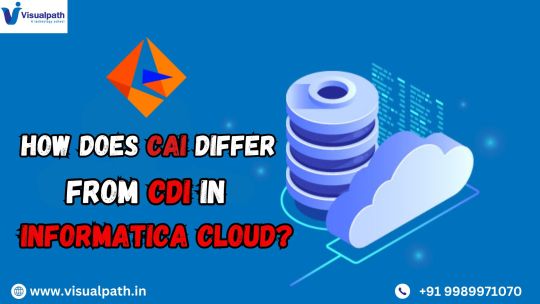
What is Cloud Application Integration (CAI)?
Cloud Application Integration (CAI) is designed to enable real-time, event-driven integration between applications. It facilitates communication between different enterprise applications, APIs, and services, ensuring seamless workflow automation and business process orchestration. CAI primarily focuses on low-latency and API-driven integration to connect diverse applications across cloud and on-premises environments.
Key Features of CAI: Informatica IICS Training
Real-Time Data Processing: Enables instant data exchange between systems without batch processing delays.
API Management: Supports REST and SOAP-based web services to facilitate API-based interactions.
Event-Driven Architecture: Triggers workflows based on system events, such as new data entries or user actions.
Process Automation: Helps in automating business processes through orchestration of multiple applications.
Low-Code Development: Provides a drag-and-drop interface to design and deploy integrations without extensive coding.
Common Use Cases of CAI:
Synchronizing customer data between CRM (Salesforce) and ERP (SAP).
Automating order processing between e-commerce platforms and inventory management systems.
Enabling chatbots and digital assistants to interact with backend databases in real time.
Creating API gateways for seamless communication between cloud and on-premises applications.
What is Cloud Data Integration (CDI)?
Cloud Data Integration (CDI), on the other hand, is focused on batch-oriented and ETL-based data integration. It enables organizations to extract, transform, and load (ETL) large volumes of data from various sources into a centralized system such as a data warehouse, data lake, or business intelligence platform.
Key Features of CDI: Informatica Cloud Training
Batch Data Processing: Handles large datasets and processes them in scheduled batches.
ETL & ELT Capabilities: Transforms and loads data efficiently using Extract-Transform-Load (ETL) or Extract-Load-Transform (ELT) approaches.
Data Quality and Governance: Ensures data integrity, cleansing, and validation before loading into the target system.
Connectivity with Multiple Data Sources: Integrates with relational databases, cloud storage, big data platforms, and enterprise applications.
Scalability and Performance Optimization: Designed to handle large-scale data operations efficiently.
Common Use Cases of CDI:
Migrating legacy data from on-premises databases to cloud-based data warehouses (e.g., Snowflake, AWS Redshift, Google BigQuery).
Consolidating customer records from multiple sources for analytics and reporting.
Performing scheduled data synchronization between transactional databases and data lakes.
Extracting insights by integrating data from IoT devices into a centralized repository.
CAI vs. CDI: Key Differences
CAI is primarily designed for real-time application connectivity and event-driven workflows, making it suitable for businesses that require instant data exchange. It focuses on API-driven interactions and process automation, ensuring seamless communication between enterprise applications. On the other hand, CDI is focused on batch-oriented data movement and transformation, enabling organizations to manage large-scale data processing efficiently.
While CAI is ideal for integrating cloud applications, automating workflows, and enabling real-time decision-making, CDI is better suited for ETL/ELT operations, data warehousing, and analytics. The choice between CAI and CDI depends on whether a business needs instant data transactions or structured data transformations for reporting and analysis. IICS Online Training
Which One Should You Use?
Use CAI when your primary need is real-time application connectivity, process automation, and API-based data exchange.
Use CDI when you require batch processing, large-scale data movement, and structured data transformation for analytics.
Use both if your organization needs a hybrid approach, where real-time data interactions (CAI) are combined with large-scale data transformations (CDI).
Conclusion
Both CAI and CDI play crucial roles in modern cloud-based integration strategies. While CAI enables seamless real-time application interactions, CDI ensures efficient data transformation and movement for analytics and reporting. Understanding their differences and choosing the right tool based on business needs can significantly improve data agility, process automation, and decision-making capabilities within an organization.
For More Information about Informatica Cloud Online Training
Contact Call/WhatsApp: +91-9989971070
Visit: https://www.visualpath.in/informatica-cloud-training-in-hyderabad.html
Visit Blog: https://visualpathblogs.com/category/informatica-cloud/
WhatsApp: https://www.whatsapp.com/catalog/919989971070/
#Informatica Training in Hyderabad#IICS Training in Hyderabad#IICS Online Training#Informatica Cloud Training#Informatica Cloud Online Training#Informatica IICS Training#Informatica Training Online#Informatica Cloud Training in Chennai#Informatica Cloud Training In Bangalore#Best Informatica Cloud Training in India#Informatica Cloud Training Institute#Informatica Cloud Training in Ameerpet
0 notes
Text
Salesforce Data Cloud: Real-Time Data for Better Decisions
Salesforce Data Cloud is a real-time, scalable platform that helps businesses unify customer data from various systems and channels into a single, comprehensive view. This “360-degree view” empowers organizations to deliver personalized experiences, actionable insights, and data-driven decisions.
It works by integrating data from multiple sources, harmonizing it, and making it actionable across all Salesforce products (Sales Cloud, Marketing Cloud, Service Cloud, etc.) as well as external systems.
Why Does Data Cloud Matter?
In modern business, customers interact with brands across many channels—websites, social media, email, in-store visits, etc. Each interaction generates data, but this data is often scattered across different systems, making it challenging to:
Understand customers fully.
Deliver personalized and relevant experiences.
Make timely, data-driven decisions.
Data Cloud solves this problem by:
Connecting data from multiple systems.
Using AI and machine learning for insights.
Enabling real-time actions across marketing, sales, and service platforms.
Key Capabilities of Salesforce Data Cloud
1. Data Integration
Brings together data from multiple sources like CRM systems, e-commerce platforms, advertising networks, and even IoT devices.
Supports structured data (e.g., customer names, transactions) and unstructured data (e.g., social media posts, call transcripts).
2. Identity Resolution
Matches and merges data points from various systems to create a unified customer profile.
For example, it can recognize that “Jane Smith” in a CRM system and “[email protected]” in an e-commerce platform are the same person.
3. Real-Time Data Processing
Captures and processes customer data as it happens.
Example: A customer adds an item to their cart online, and the system immediately updates their profile to show they’re interested in that product.
4. Segmentation
Uses AI to segment customers into groups based on behavior, demographics, or preferences.
Example: A retailer could create segments like “frequent shoppers” or “customers likely to churn.”
5. Data Activation
Makes unified data actionable by syncing it across Salesforce tools and external applications.
Example: Activates customer segments for marketing campaigns or shares insights with customer service reps.
6. Insights and AI
Powered by Salesforce’s Einstein AI, it provides predictive analytics, next-best-action recommendations, and insights into customer behaviors.
7. Compliance and Privacy
Helps businesses stay compliant with global data privacy regulations (e.g., GDPR, CCPA) by providing tools to manage consent and ensure proper data governance.
How Data Cloud Works: The Process
Data Collection:
Data Cloud collects information from different sources like Salesforce apps, external CRMs, ERP systems, e-commerce platforms, and social media.
Data Unification:
It uses advanced matching and identity resolution algorithms to merge disparate data into a single customer profile.
Data Harmonization:
Standardizes and cleans data to ensure consistency and usability.
Storage:
Stores data in a centralized repository designed for high scalability.
Real-Time Updates:
Updates customer profiles in real time based on new interactions or behaviors.
Insights and Actions:
Delivers insights through analytics dashboards and activates data across Salesforce and other platforms for marketing, sales, and service efforts.
Architecture of Salesforce Data Cloud
Data Ingestion Layer:
Handles data intake from various sources, including APIs, flat files, databases, and real-time event streams.
Data Processing Layer:
Performs data cleansing, harmonization, and identity resolution.
Data Storage Layer:
Stores unified profiles in a scalable and secure manner.
AI and Insights Layer:
Applies AI models and business rules to generate insights and predict customer behavior.
Activation Layer:
Syncs actionable insights across Salesforce products and external platforms.
Practical Use Cases
1. Retail
Problem: Customers shop online and in-store, but the data is siloed.
Solution: Data Cloud unifies online browsing data with in-store purchases. Retailers can:
Send personalized offers based on a customer’s browsing history.
Suggest products based on previous purchases.
2. Financial Services
Problem: Banks have fragmented customer data from loans, investments, and accounts.
Solution: Data Cloud creates a unified customer profile, enabling advisors to:
Recommend personalized financial products.
Predict churn risks and offer retention strategies.
3. Healthcare
Problem: Patient records are spread across different systems (hospitals, labs, pharmacies).
Solution: Data Cloud unifies patient data for:
Coordinated care.
Real-time updates for medical teams.
4. Automotive
Problem: Vehicle manufacturers struggle to connect customer interactions with dealerships.
Solution: Data Cloud enables:
Proactive service reminders based on vehicle usage.
Personalized offers for new car purchases.
5. Marketing
Problem: Campaigns are often generalized and lack precision.
Solution: Data Cloud enables segmentation and real-time personalization, ensuring campaigns target the right audience with the right message.
Advantages of Using Salesforce Data Cloud
Personalization at Scale:
Create tailored experiences for millions of customers simultaneously.
Faster Decision-Making:
Real-time data processing allows businesses to respond to customer needs instantly.
Operational Efficiency:
Automates data integration, reducing manual processes.
Seamless Integration:
Native integration with Salesforce products ensures a smooth workflow across departments.
Future-Proofing:
Built to handle the growing volume, variety, and velocity of customer data in the digital age.
Conclusion
Salesforce Data Cloud is more than just a data integration tool—it’s a comprehensive platform designed to unify, analyze, and activate customer data in real time.
Whether you’re in retail, healthcare, finance, or any other industry, it enables you to understand your customers deeply and act on insights quickly, ensuring that every customer interaction is meaningful and personalized.
Would you like assistance in understanding how Data Cloud could integrate with your existing systems or in identifying the best use cases for your organization?
0 notes
Text
How Celigo iPaaS Streamlines Business Connectivity?

Integrating different business systems can be complex, but with Celigo iPaaS (Integration Platform as a Service), it doesn’t have to be. Celigo offers an intuitive platform that allows even non-technical users to easily connect tools like Oracle NetSuite, CRMs, and e-commerce platforms. No coding required! With Celigo, businesses can streamline their processes, automate data flows, and ensure all systems are in sync—saving time and boosting efficiency.
Time and Cost Savings: The Efficiency Gains with Celigo iPaaS
Celigo iPaaS offers significant time and cost savings by automating repetitive tasks and reducing manual intervention in data transfers. Its drag-and-drop interface minimizes development time, allowing businesses to set up integrations without needing specialized programming expertise. This not only accelerates project timelines but also cuts down on labor costs. The platform’s ability to handle complex workflows and large data volumes efficiently also ensures that businesses can focus on scaling their operations without worrying about integration bottlenecks.
Pre-built Connectors: Accelerating Integration with Celigo Marketplace
Celigo’s Marketplace offers a wide array of pre-built connectors, covering popular applications such as Salesforce, Oracle NetSuite, Shopify, Magento, SAP, Google Workspace. These pre-built connectors help businesses jump-start their integrations, removing the need for custom development from scratch. With access to these connectors, companies can quickly connect their systems and leverage out-of-the-box automation solutions tailored to their needs. This not only speeds up implementation but also ensures that integration efforts are based on best practices already embedded in these pre-built solutions.
Flexible Data Mapping: Achieving Seamless Data Transfer with Celigo
One of the key benefits of Celigo iPaaS is its flexible data mapping capabilities. This allows businesses to customize how data is transferred between systems, ensuring that information flows smoothly and accurately, regardless of system-specific data formats. With Celigo’s user-friendly interface, users can create custom data transformations and map fields across applications without needing advanced technical skills. This flexibility reduces errors in data transfers, ensuring that the right data reaches the right place at the right time.
Real-Time Data Processing: The Advantage of Event-Driven Integrations
Celigo iPaaS supports real-time, event-driven integrations, allowing businesses to process data as soon as an event occurs in any connected system. This is crucial for industries where immediate data availability can impact decision-making, such as e-commerce, finance, and supply chain management. By enabling real-time data processing, Celigo ensures that business operations stay updated, helping companies respond quickly to changes, whether it’s processing an online order or updating inventory levels in real-time.
Security Assurance: Certifications and Measures in Celigo iPaaS
Security is a top priority for any integration platform, and Celigo meets this need by providing robust security features, including encryption, data masking, and role-based access controls. The platform is compliant with major industry standards, such as GDPR, SOC 2, and HIPAA, ensuring that sensitive business data is protected at all times. By leveraging secure APIs and certified connectors, businesses can trust that their data is being transmitted and stored securely across integrated applications.
Scalability with Confidence: How Celigo Supports Growing Integration Needs
As businesses grow, so do their integration needs. Celigo iPaaS is built to scale with businesses, offering the flexibility to handle increasing data volumes, complex workflows, and expanding systems. The platform’s cloud-based architecture ensures that it can accommodate new applications and processes without compromising performance. Celigo’s scalability also extends to its pricing model, allowing companies to pay for what they need and scale up as their integration demands increase, offering long-term value as organizations evolve.
Error Handling Best Practices: Minimizing Disruptions in Integrations
Errors in data transfers and integrations can cause major disruptions in business processes. Celigo iPaaS offers built-in error-handling mechanisms that allow businesses to identify and resolve issues before they escalate. The platform provides real-time error notifications and detailed logs, giving users the ability to troubleshoot and correct errors swiftly. Additionally, Celigo’s automated retry mechanisms ensure that temporary issues, such as network outages, do not halt integrations indefinitely, minimizing downtime and keeping operations running smoothly.
Custom Connector Development: Extending Functionality with Celigo iPaaS
While Celigo offers a rich library of pre-built connectors, it also allows businesses to create custom connectors tailored to their unique needs. With Celigo’s custom connector development tools, businesses can integrate with niche applications or internal systems that may not have existing connectors in the marketplace. This feature extends Celigo’s flexibility, ensuring that businesses can connect all their critical systems, regardless of whether they are mainstream or proprietary. Custom connectors can be developed by in-house teams or with the help of Celigo’s professional services, providing a path to unlimited integration possibilities.
Choose Integs Cloud
For more information on how Celigo iPaaS can transform your business through seamless integrations, contact Integs Cloud. Our team of experts is ready to help you streamline operations and boost efficiency with tailored Celigo solutions. Let’s connect and explore how we can simplify your integration needs! Contact Us Now!
#Celigo#IntegsCloud#BusinessAutomation#Integration#CeligoPartner#CeligoServicePartner#Efficiency#Productivity#SaveTime#WorkflowOptimization#BusinessGrowth#DigitalTransformation#iPaaS#CloudIntegration#Automation#EnterpriseTech
0 notes
Text
Salesforce Services in the UAE: Empowering Digital Transformation
In the rapidly evolving digital landscape, businesses in the UAE are increasingly turning to Salesforce to transform their operations and deliver exceptional customer experiences. Salesforce, a global leader in customer relationship management (CRM), offers cloud-based solutions that enable organizations to streamline processes, engage customers effectively, and drive growth. With the UAE’s focus on innovation and digital transformation, Salesforce services have become pivotal for companies across various industries.
Why Salesforce is Crucial for Businesses in the UAE
The UAE has positioned itself as a global hub for commerce, technology, and innovation, attracting businesses from around the world. To stay competitive in this fast-paced environment, companies need agile solutions that allow them to connect with customers, optimize operations, and make data-driven decisions. Salesforce provides this capability through its comprehensive suite of tools that are highly customizable to meet the specific needs of businesses in the region.
One of the key reasons Salesforce has gained prominence Salesforce service in UAE is its ability to support digital transformation strategies. Companies in the UAE are increasingly adopting cloud-based technologies to enhance their operational efficiency. Salesforce, with its wide range of cloud services like Sales Cloud, Service Cloud, and Marketing Cloud, helps organizations manage their customer relationships, automate sales and marketing processes, and improve customer service.
Tailored Solutions for Diverse Industries
Salesforce services in the UAE cater to a diverse array of industries, including retail, finance, healthcare, real estate, and government sectors. Its flexible architecture allows companies to deploy industry-specific solutions that address their unique challenges. For example, in the UAE's booming real estate sector, Salesforce helps property developers manage customer inquiries, automate lead generation, and provide personalized communication to potential buyers.
The healthcare industry in the UAE also benefits from Salesforce’s Health Cloud, which allows healthcare providers to streamline patient management, enhance collaboration among healthcare teams, and deliver better patient outcomes. Similarly, financial institutions leverage Salesforce’s Financial Services Cloud to offer personalized banking experiences and maintain regulatory compliance.
Enhancing Customer Experiences
In a market like the UAE, where customer expectations are continually rising, delivering superior customer experiences is critical. Salesforce enables businesses to gain a 360-degree view of their customers by integrating data from various sources such as social media, emails, and transactions. This allows companies to create personalized marketing campaigns, provide proactive customer support, and predict customer behavior to drive engagement.
Supporting Innovation and Growth
Salesforce’s presence in the UAE is not just limited to large enterprises; small and medium-sized businesses (SMBs) are also leveraging its solutions to fuel their growth. With Salesforce’s scalable platform, SMBs can start with basic functionalities and expand their capabilities as their business grows. This flexibility makes Salesforce an attractive option for businesses of all sizes looking to innovate and scale in the competitive UAE market.
Conclusion
Salesforce services in the UAE are playing a critical role in helping businesses navigate the complexities of the modern digital economy. By offering powerful tools for managing customer relationships, streamlining operations, and driving innovation, Salesforce is enabling UAE companies to stay ahead of the competition and achieve long-term success. As the UAE continues to invest in its digital future, Salesforce is poised to remain a key partner for businesses looking to embrace transformation.
1 note
·
View note
Text
How to Start Learning Salesforce Commerce Cloud: A Step-by-Step Guide
Salesforce Commerce Cloud (SFCC) is a robust e-commerce platform designed for businesses to provide personalized experiences for customers. With its capabilities to manage product catalogs, orders, promotions, and customer data across multiple channels, learning SFCC can open up new opportunities in the world of digital commerce. Whether you are a developer, marketer, or e-commerce manager, mastering Salesforce Commerce Cloud will give you the edge in today’s competitive landscape. 1. Understand What Salesforce Commerce Cloud Is Before diving into the learning resources, it’s essential to understand what Salesforce Commerce Cloud offers and how it fits into the broader Salesforce ecosystem. SFCC comes in two main flavors: - B2C Commerce: For businesses selling directly to consumers. It focuses on enhancing the customer shopping experience across all touchpoints (web, mobile, social, etc.). - B2B Commerce: For businesses selling to other businesses, focusing on managing complex buyer journeys and bulk orders. 2. Identify Your Role and Goals Salesforce Commerce Cloud learning paths differ based on your role. Consider the following: - Developer: You’ll focus on customizing the platform, working with Salesforce’s APIs, and implementing e-commerce solutions. - Administrator: You’ll handle configuration, troubleshooting, and maintaining platform stability. - Business User (Marketer or Store Manager): You’ll work with product catalogs, promotions, campaigns, and customer journeys. Clearly defining your role will guide you toward the right resources, tools, and training paths. 3. Set Up a Salesforce Commerce Cloud Account While getting access to a full Salesforce Commerce Cloud instance can be tricky, you can start by setting up a Developer Sandbox or requesting a Commerce Cloud Demo from Salesforce. For those who can’t get direct access right away, many features and concepts can be learned theoretically, which will still be useful when you get hands-on experience. 4. Learn the Basics of Salesforce and Cloud Computing If you're completely new to Salesforce or cloud-based platforms, it's important to grasp the fundamentals of Salesforce's overall structure: - Trailhead: Salesforce's free learning platform provides beginner-friendly modules on Salesforce fundamentals, cloud computing, and overviews of Commerce Cloud. - Begin with the Salesforce Platform Basics trail on Trailhead to familiarize yourself with core concepts. - Next, explore the B2C Commerce and B2B Commerce trails to get an understanding of Commerce Cloud features. 5. Master Key Concepts in Salesforce Commerce Cloud Salesforce Commerce Cloud has several key concepts that form the backbone of the platform. Before you start building solutions, it's vital to have a strong understanding of these: - Storefront Reference Architecture (SFRA): Salesforce’s modern, developer-friendly framework for creating scalable storefronts. Understanding how to leverage SFRA will be crucial for developers. - Commerce Cloud Digital: It includes tools for managing online storefronts, merchandising, and handling customer journeys. - Product and Catalog Management: How to create and manage product listings, categories, and pricing. - Order Management: Understand the lifecycle of an order, from checkout to fulfillment. - Promotions and Campaigns: How to configure promotions and handle discounts and offers. - APIs and Integrations: SFCC comes with robust APIs that allow for seamless integration with other tools, such as CRM, payment gateways, shipping services, and more. 6. Dive Into Salesforce Commerce Cloud Documentation Salesforce provides extensive documentation to help developers, administrators, and business users get a better grip on SFCC. You can access detailed guides, API references, and best practices: - Salesforce B2C Commerce Documentation: This includes setup, development, and maintenance guides for storefronts. - Salesforce B2B Commerce Documentation: Tailored for businesses selling to other businesses. - API Documentation: For developers working on integrations or custom solutions. 7. Explore Salesforce Trailhead for Commerce Cloud Salesforce Trailhead offers dedicated modules that cover all aspects of Salesforce Commerce Cloud. These hands-on, interactive courses allow you to build your knowledge in a structured manner. Some of the relevant trails include: - Get Started with Salesforce B2C Commerce: This trail introduces the B2C Commerce platform, exploring features such as merchandising, promotions, and checkout processes. - Develop for B2C Commerce: Focuses on SFCC development using Storefront Reference Architecture (SFRA). - B2B Commerce for Administrators: For learning how to configure and manage B2B Commerce. Each module on Trailhead provides you with points and badges, helping to motivate you while tracking your learning progress. 8. Join the Salesforce Community The Salesforce community is one of the most active and engaged in the tech space. You can learn a lot from experienced professionals, ask questions, and share your knowledge. Here are some ways to connect: - Salesforce Trailblazer Community: Join this community to network with professionals, attend meetups, and exchange tips on Commerce Cloud. - Salesforce StackExchange: A Q&A forum where developers and admins can ask technical questions and receive answers from experts. - LinkedIn Groups: There are several groups dedicated to Salesforce professionals, such as the Salesforce B2C Commerce Cloud User Group. 9. Practice with Real Projects If you're learning Salesforce Commerce Cloud as a developer, there's no substitute for hands-on experience. Once you’ve gone through the basics, try to work on real-world projects. This could be setting up your own e-commerce site in a developer sandbox or contributing to open-source projects that use Salesforce. 10. Consider Salesforce Certifications Salesforce offers certifications that validate your expertise in various aspects of the platform. A certification can significantly enhance your career prospects. Some of the most relevant certifications for Commerce Cloud include: - B2C Commerce Developer: For those looking to build and develop custom e-commerce solutions. - B2C Commerce Architect: Designed for professionals aiming to architect complex solutions on the B2C Commerce platform. - B2B Commerce Administrator: For administrators managing Salesforce B2B commerce instances. 11. Stay Updated Salesforce Commerce Cloud, like most cloud platforms, is constantly evolving. Make sure you stay updated by subscribing to Salesforce blogs, attending webinars, and following key influencers in the Salesforce ecosystem. Conclusion Learning Salesforce Commerce Cloud can open doors to a rewarding career in digital commerce. By following a structured approach, leveraging learning resources such as Trailhead, and engaging with the Salesforce community, you can build a strong foundation in SFCC. Whether you aim to become a developer, administrator, or marketer, the journey to mastering Salesforce Commerce Cloud is both challenging and exciting. Start your learning today and tap into the immense potential of this leading e-commerce platform! Read the full article
0 notes
Text
Custom Mobile Application Development Services: Tailored Solutions for Your Business Needs
Cloud Infra Setup
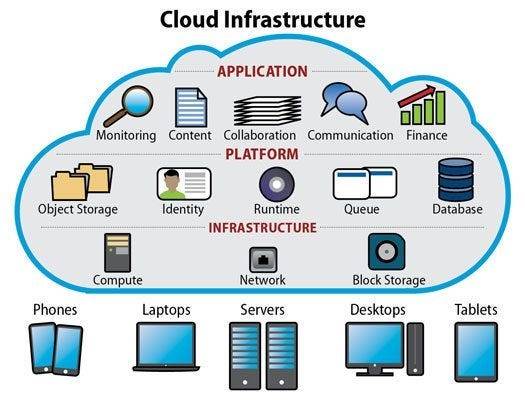
RDS vs. Redshift
When choosing betweenAmazon RDS vs Redshift, it’s important to understand their distinct purposes.RDS(Relational Database Service) is ideal for transactional databases and supports multiple database engines like MySQL, PostgreSQL, and SQL Server. In contrast,Redshift Is a data warehouse service optimized for complex queries and analytics. Your choice depends on whether you need an operational database for daily transactions or a powerful analytics engine for business intelligence.
Build Cloud Computing Infrastructure
Building a robust cloud computing infrastructure involves careful planning and execution. Start by choosing the appropriate cloud provider and defining your architecture to meet performance, security, and scalability requirements. Deploy virtual machines, storage solutions, and network configurations, and implement best practices for security and compliance. A well-built cloud infrastructure is the backbone of your digital operations, ensuring reliability and agility.
Salesforce Commerce Cloud Solutions
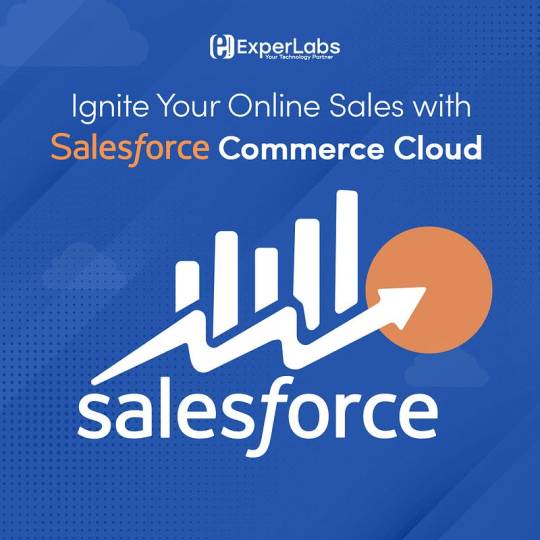
Salesforce Commerce Cloud Agency
Partnering with aSalesforce Commerce Cloud agency can transform your e-commerce operations. These agencies provide expert guidance, implementation services, and ongoing support to ensure you maximize the potential ofSalesforce Commerce Cloud. Whether you need custom development, integration with other systems, or strategic advice, a dedicated agency can help you achieve your business goals.
Salesforce Commerce Cloud Development Services
Salesforce Commerce Cloud Development Services Encompass the creation and customization of your e-commerce platform. This includes designing user-friendly interfaces, integrating third-party applications, and optimizing performance. Expert developers ensure your platform is tailored to your specific needs, providing a seamless shopping experience for your customers and driving your online sales growth.
Salesforce Commerce Cloud Services
ComprehensiveSalesforce Commerce Cloud Services Cover every aspect of your e-commerce journey. From initial setup and configuration to ongoing maintenance and optimization, these services ensure your platform runs smoothly and efficiently. With a focus on scalability, security, and customer satisfaction,Salesforce Commerce Cloud Services Empower your business to thrive in the competitive digital marketplace.
Custom Software Development Services in New York

Full Stack Development Companies in USA
Full stack development companies in the USAoffer end-to-end development services, covering both front-end and back-end development. These companies have expertise in a wide range of technologies and frameworks, enabling them to build comprehensive and dynamic web and mobile applications. Partnering with a full stack development company ensures a seamless development process and a high-quality end product.
Leading Software Development Company
A leading software development company stands out for its innovative solutions, technical expertise, and customer-centric approach. These companies deliver high-quality software that meets industry standards and exceeds client expectations. By leveraging cutting-edge technologies and best practices, leading software development company drives digital transformation and business growth.
Expert Software Development Company
An expert software development company provides specialized knowledge and skills to tackle complex software challenges. These companies offer a deep understanding of various industries and technologies, ensuring they can deliver customized solutions that address specific business needs. With a focus on quality, innovation, and client satisfaction, an expert software development company helps businesses achieve their digital objectives.
B2B Commerce Cloud
B2B Commerce Cloud is revolutionizing the way businesses conduct transactions with other businesses. By leveraging the power of cloud technology, it offers scalable, secure, and efficient solutions that streamline procurement, order management, and customer interactions.B2B Commerce Cloud Provides businesses with the tools they need to manage complex purchasing processes, personalize the buying experience, and drive sales growth.
Salesforce Commerce Cloud Setup
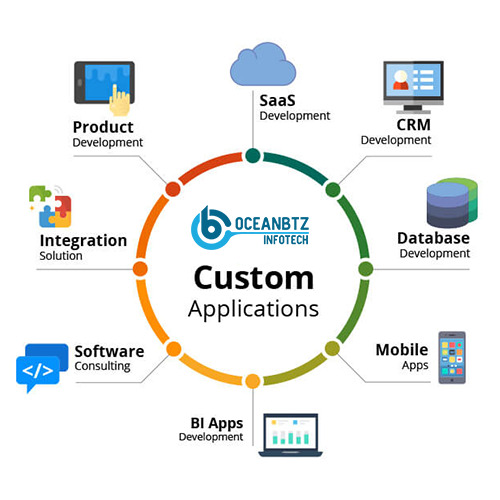
Salesforce B2B Ecommerce Solution
Salesforce B2B eCommerce solution offers a comprehensive platform for businesses to engage with their B2B customers effectively. This solution includes features such as advanced catalog management, personalized pricing, and automated order processing. With Salesforce B2B eCommerce, businesses can provide a seamless and efficient purchasing experience, improve customer satisfaction, and increase sales by leveraging Salesforce’s robust CRM and e-commerce capabilities.
Mobile App Consulting Services
Mobile app consulting services provide expert guidance and strategic insights to help businesses navigate the complexities of mobile app development. These services include market analysis, user experience design, technology selection, and project management. By leveraging mobile app consulting services, businesses can ensure their apps are optimized for performance, user engagement, and scalability, ultimately leading to successful app launches and sustained growth.
Custom Development Solutions
Custom development solutions are tailored to meet the unique needs of businesses, offering bespoke software applications designed to enhance operational efficiency and competitive advantage. These solutions encompass everything from initial concept and design to development, testing, and deployment. By opting for custom development solutions, businesses can address specific challenges, integrate seamlessly with existing systems, and achieve higher levels of functionality and user satisfaction.
Commerce Cloud Developer

Cross Platform App Development Company
Across platform app development company excels in creating mobile applications that function seamlessly across multiple operating systems, such as iOS and Android. These companies use technologies like React Native, Flutter, and Xamarin to develop apps that offer native performance and a consistent user experience. Partnering with across platform app development company allows businesses to reach a wider audience, reduce development costs, and speed up the time-to-market for their apps.
PHP Web Development Services
PHP web development services provide businesses with dynamic, scalable, and high-performance web solutions. PHP, being a versatile and widely-used scripting language, is ideal for developing everything from simple websites to complex web applications. PHP web development services include custom PHP development, CMS development, e-commerce solutions, and API integration. Leveraging these services ensures robust, secure, and efficient web applications tailored to meet your business needs.
0 notes
Text
Dell Boomi Basics

Dell Boomi Basics: Your Guide to Simplified Integration
Picture a world where your various business applications, from your CRM to your accounting software, talk seamlessly to each other. That’s the power of Dell Boomi, a leading cloud-based integration platform. Let’s dive into the basics!
What exactly is Dell Boomi?
Think of Dell Boomi as a digital bridge-builder. It’s an iPaaS (Integration Platform as a Service) that lives in the cloud and helps you connect different applications and data sources. Whether your data lives on-premise in your systems or other clouds, Boomi can link them together, creating automated workflows and smooth data exchange.
Why use Dell Boomi?
Speed and Agility: Boomi’s drag-and-drop interface and pre-built connectors let you set up integrations lightning-fast, saving time and coding headaches.
Scalability: It grows along with your business needs. You can easily handle more data and applications without a hefty infrastructure overhaul.
Reliability: Dell Boomi’s cloud architecture is highly available and secure, so you can trust your critical data flows.
Flexibility: It can integrate just about anything – cloud apps, legacy systems, databases, and even files.
Cost-Effectiveness: Its pay-as-you-go approach eliminates significant upfront investments for integration software.
Critical Concepts in Dell Boomi
Processes: These are your automated workflows in Boomi. Think of them as recipes that tell Boomi what steps to follow during integration.
Connectors: Pre-built components that let Boomi talk to applications like Salesforce, NetSuite, SAP, and more.
Shapes: These are the building blocks of your processes. Each shape has a function, like data mapping, decision-making, or sending emails.
AtomSphere: Dell Boomi’s cloud platform, where you build, deploy, and manage your integrations.
Common Use Cases
Customer Data Synchronization: Keep your CRM system up-to-date with the latest customer info from your website or marketing tools.
Order Processing: Automatically send new orders from your e-commerce platform to your fulfillment system.
Data Migration: Smoothly move data from old systems to new ones.
API Creation and Management: Build APIs to expose your data to partners or internal systems and manage their usage.
Ready to Simplify Your Integration?
If you’re looking to streamline the communication between your business applications, Dell Boomi might be the perfect fit. Its user-friendliness, breadth of capabilities, and cloud nature make it a compelling choice for businesses of all sizes.
youtube
You can find more information about Dell Boomi in this Dell Boomi Link
Conclusion:
Unogeeks is the No.1 IT Training Institute for Dell Boomi Training. Anyone Disagree? Please drop in a comment
You can check out our other latest blogs on Dell Boomi here – Dell Boomi Blogs
You can check out our Best In Class Dell Boomi Details here – Dell Boomi Training
Follow & Connect with us:
———————————-
For Training inquiries:
Call/Whatsapp: +91 73960 33555
Mail us at: [email protected]
Our Website ➜ https://unogeeks.com
Follow us:
Instagram: https://www.instagram.com/unogeeks
Facebook: https://www.facebook.com/UnogeeksSoftwareTrainingInstitute
Twitter: https://twitter.com/unogeek
0 notes
Text
Dell Boomi Company

Dell Boomi: The Powerhouse of Cloud Integration
In today’s rapidly evolving digital world, businesses constantly seek ways to streamline their processes, enhance data flow, and connect disparate systems seamlessly. Dell Boomi emerges as the forefront leader in cloud-based integration solutions, empowering organizations to achieve unprecedented connectivity and agility. Let’s delve into the world of Dell Boomi and uncover its pivotal role in modern business strategies.
What is Dell Boomi?
Founded in 2000, Dell Boomi is a leading integration platform provider and service provider (iPaaS). It delivers a cloud-native platform that helps businesses of all sizes integrate and automate their applications, data sources, devices, and processes across all environments – from on-premises systems to cloud-based services.
Key Features that Make Dell Boomi Stand Out
Visual Drag-and-Drop Interface: Boomi’s intuitive, user-friendly interface empowers developers and non-technical business users to create and manage complex integrations easily. It eliminates the need for extensive coding expertise.
Extensive Connector Library: Boomi offers many pre-built connectors for popular enterprise systems (Salesforce, SAP, Oracle, NetSuite), cloud services (AWS, Azure, Google Cloud), databases, social media platforms, and more. This significantly accelerates integration projects.
Robust Data Transformation and Mapping Tools: Boomi provides powerful tools for transforming data between different formats and structures, ensuring data consistency and compatibility across systems.
Enterprise-grade Management and Monitoring: Boomi’s centralized dashboard and management capabilities allow IT teams to monitor integrations, identify and resolve issues in real-time, and ensure the health of their integration landscape.
Benefits of Using Dell Boomi
Accelerated Business Processes: Boomi streamlines the flow of information across systems, enabling faster decision-making and execution.
Improved Operational Efficiency: Automated integrations reduce manual tasks, minimize errors, and save valuable time for more strategic activities.
Enhanced Data Visibility: By connecting data silos, Boomi provides a 360-degree view of customers, products, and operations, leading to better insights.
Increased Agility: Boomi’s low-code approach allows businesses to rapidly adapt and integrate new systems or applications as requirements change.
Scalability to Match Business Growth: Boomi’s cloud-based architecture can seamlessly scale to accommodate increasing volumes of data and integration needs.
Dell Boomi Use Cases
Dell Boomi caters to various industry verticals and addresses diverse integration challenges:
Customer 360: Integrate customer data from CRM, ERP, marketing automation, and social media to gain a comprehensive understanding of customers.
Supply Chain Optimization: Connect suppliers, logistics systems, warehouses, and retailers for real-time inventory visibility and order tracking.
Healthcare Data Exchange: Ensure secure and compliant data exchange between patient portals, EHR systems, and healthcare providers.
E-commerce Order Processing: Integrate e-commerce platforms with inventory management systems, payment gateways, and shipping providers.
The Future with Dell Boomi
As businesses accelerate their digital transformation journeys, the demand for intelligent integration solutions like Dell Boomi will continue to soar. Their commitment to innovation and focus on emerging areas such as API management and artificial intelligence promises to further solidify Dell Boomi as an indispensable pillar for connected data-driven enterprises.
youtube
You can find more information about Dell Boomi in this Dell Boomi Link
Conclusion:
Unogeeks is the No.1 IT Training Institute for Dell Boomi Training. Anyone Disagree? Please drop in a comment
You can check out our other latest blogs on Dell Boomi here – Dell Boomi Blogs
You can check out our Best In Class Dell Boomi Details here – Dell Boomi Training
Follow & Connect with us:
———————————-
For Training inquiries:
Call/Whatsapp: +91 73960 33555
Mail us at: [email protected]
Our Website ➜ https://unogeeks.com
Follow us:
Instagram: https://www.instagram.com/unogeeks
Facebook: https://www.facebook.com/UnogeeksSoftwareTrainingInstitute
Twitter: https://twitter.com/unogeek
0 notes
Text
MuleSoft for Salesforce

MuleSoft provides integration solutions that can be particularly valuable for Salesforce users and organizations. By using MuleSoft with Salesforce, you can achieve seamless connectivity, automation, and data synchronization between Salesforce and other systems within and outside your organization. Here’s how MuleSoft can be beneficial for Salesforce integration:
Connectivity: MuleSoft offers a wide range of pre-built connectors and templates that make it easy to connect Salesforce with other applications, databases, and systems. These connectors enable you to access Salesforce data, trigger events in Salesforce, and synchronize data between Salesforce and other platforms.
API Management: MuleSoft’s Anypoint Platform provides comprehensive API management capabilities. You can use it to create, publish, secure, and manage APIs for your Salesforce instances, allowing external applications to interact securely with Salesforce data and functionality.
Data Integration: MuleSoft allows you to integrate Salesforce with various data sources, such as on-premises databases, cloud services, and third-party applications. This integration enables you to transfer data bi-directionally between Salesforce and other systems in real-time or as batch processes.
Business Process Automation: MuleSoft’s integration capabilities can automate business processes that involve Salesforce. For example, you can automate lead-to-opportunity conversion, order processing, and customer support workflows by orchestrating interactions between Salesforce and other systems.
Data Synchronization: MuleSoft can synchronize data between Salesforce and other applications, ensuring that information is up-to-date across your organization. This is especially important for maintaining accurate customer records and sales data.
Event-Driven Integration: MuleSoft supports event-driven architecture, allowing you to trigger actions in Salesforce based on external events or vice versa. For instance, you can create opportunities in Salesforce when a new order is received in your e-commerce system.
Customization and Transformation: MuleSoft’s DataWeave transformation language enables you to customize data mapping and transformation between Salesforce and other systems, ensuring data consistency and compatibility.
Security and Compliance: MuleSoft provides robust security features, including OAuth 2.0 support, encryption, and access controls, to protect sensitive Salesforce data and ensure compliance with security standards.
Analytics and Reporting: You can use MuleSoft to extract data from Salesforce for analysis and reporting in other analytics tools or data warehouses. This allows for more advanced reporting and business intelligence capabilities.
Scalability and High Availability: MuleSoft deployments can be scaled and configured for high availability, ensuring that your Salesforce integrations are reliable and can handle increased workloads.
Real-Time Alerts: You can set up real-time alerts and notifications based on Salesforce events, such as lead updates, opportunities won, or support case escalations, and trigger actions in response to these events.
Demo Day 1 Video:
youtube
You can find more information about Mulesoft in this Mulesoft Docs Link
Conclusion:
Unogeeks is the №1 Training Institute for Mulesoft Training. Anyone Disagree? Please drop in a comment
You can check out our other latest blogs on Mulesoft Training here — Mulesoft Blogs
You can check out our Best in Class Mulesoft Training details here — Mulesoft Training
Follow & Connect with us:
— — — — — — — — — — — -
For Training inquiries:
Call/Whatsapp: +91 73960 33555
Mail us at: [email protected]
Our Website ➜ https://unogeeks.com
Follow us:
Instagram: https://www.instagram.com/unogeeks
Facebook: https://www.facebook.com/UnogeeksSoftwareTrainingInstitute
Twitter: https://twitter.com/unogeeks
#MULESOFT #MULESOFTTARINING #UNOGEEKS #UNOGEEKS TRAINING
0 notes
Text
SFRA Technical Benefits Tutorial for Salesforce Programmers | Store Front Reference Architecture
Full Video Link https://youtube.com/shorts/XTrRxcaEV5I Hi, a new #video on #sfra technical benefits #salesforce #storefront #reference #architecture #sfcc #cloud #salesforce is published on #codeonedigest #youtube channel. @java #java #awsclo
** SFRA Storefront Reference Architecture ** Salesforce B2C Commerce launched the Storefront Reference Architecture (SFRA) in 2018 to provide a starting point for retailers to build state-of-the-art shopping experiences quicker and easier than before. It was built on mobile-first optimized UX which is much more efficient, robust, scalable, and modern compared to the older SiteGenesis model. **…

View On WordPress
#mobile first design#model view controller pattern#monolithic architecture#mvc design pattern#salesforce#salesforce commerce cloud#salesforce commerce cloud architecture#salesforce commerce cloud b2b#salesforce commerce cloud b2c#salesforce commerce cloud b2c tutorial#salesforce commerce cloud demo#salesforce commerce cloud developer tutorial#salesforce commerce cloud integration#salesforce commerce cloud page designer#salesforce commerce cloud project#salesforce commerce cloud setup#salesforce sfra#sfcc#sfra#sfra explained#sfra tutorial#sfra vs sitegensis#sitegenesis#sitegenesis vs sfra#storefront reference architecture#storefront reference architecture explained#storefront reference architecture tutorial#storefront reference architecture vs sitegenesis
0 notes
Text
Salesforce Cloud Computing: Revolutionizing Business Operations
In today's fast-paced and interconnected digital world, businesses are constantly searching for innovative solutions to streamline their operations, improve efficiency, and drive growth. One such solution that has gained significant traction is Salesforce cloud computing. In this article, we will explore what Salesforce cloud computing is and how it works, empowering organizations to transform the way they manage customer relationships and revolutionize their business processes.
At its core, Salesforce is a cloud-based customer relationship management (CRM) platform that helps businesses of all sizes manage their interactions with customers and prospects. It provides a centralized hub where companies can store and access customer data, track sales opportunities, automate marketing campaigns, and provide exceptional customer service.
But what sets Salesforce apart is its cloud computing architecture. Unlike traditional software applications that require installation and maintenance on individual computers or servers, Salesforce operates entirely in the cloud. This means that users can access their Salesforce instance from any device with an internet connection, eliminating the need for costly infrastructure and ensuring seamless collaboration across teams and locations.
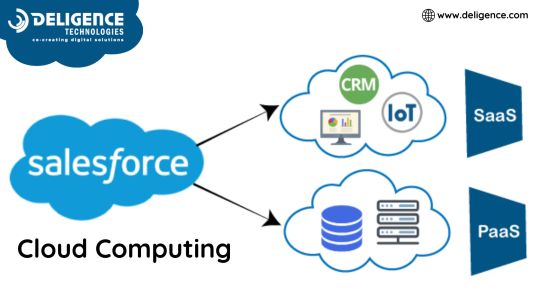
So, how does Salesforce cloud computing work? Let's break it down into three key components:
Infrastructure: Salesforce leverages a robust cloud infrastructure to host its CRM platform. This infrastructure consists of data centers located worldwide, equipped with cutting-edge hardware, secure networks, and redundant systems to ensure maximum uptime and data protection. This infrastructure is maintained and managed by Salesforce, allowing businesses to focus on their core activities without worrying about infrastructure maintenance or upgrades.
Platform: Salesforce provides a comprehensive platform that encompasses various cloud services tailored to specific business needs. These services include Sales Cloud, Service Cloud, Marketing Cloud, Commerce Cloud, and more. Each cloud service offers a set of tools and features designed to address specific business challenges. For example, Sales Cloud enables organizations to manage their sales pipelines, track leads, and automate sales processes, while Service Cloud empowers businesses to deliver exceptional customer support through various channels.
Software-as-a-Service (SaaS): Salesforce operates on a Software-as-a-Service model, meaning that businesses subscribe to the platform rather than purchasing and installing software licenses. This subscription-based model provides several advantages, including scalability, regular updates and enhancements, and simplified pricing structures. It also ensures that businesses always have access to the latest features and innovations without the hassle of manual upgrades.
With Salesforce cloud computing, businesses can unlock numerous benefits:
Centralized Data: Salesforce consolidates customer data into a single, unified platform, providing a 360-degree view of each customer. This enables businesses to better understand their customers' needs, personalize interactions, and build stronger relationships.
Automation and Efficiency: Salesforce automates repetitive and manual tasks, allowing teams to focus on high-value activities. Workflows, approval processes, and email automation streamline business processes, saving time and improving productivity.
Collaboration and Mobility: As a cloud-based solution, Salesforce enables teams to collaborate and access critical information from anywhere, at any time. This fosters seamless communication and empowers mobile workforces to stay connected and productive on the go.
Scalability and Flexibility: Salesforce scales with businesses as they grow. It offers customizable features and integrations with other systems, ensuring that organizations can adapt the platform to their specific requirements.
In conclusion, Salesforce cloud computing is revolutionizing the way businesses manage customer relationships and drive growth. By leveraging its cloud-based infrastructure, comprehensive platform, and Software-as-a-Service model, Salesforce provides a powerful and scalable solution for businesses of all sizes. With centralized data, automation, collaboration, and mobility, organizations can unlock their full potential and deliver exceptional customer experiences in today's digital age.
1 note
·
View note
Text
Minds Insights introduced a new report entitled “Global Augmented Analytics Market Review 2020-2021 Forecast to 2027”.
Minds Insights introduced a new report entitled “Global Augmented Analytics Market Review 2020-2021 Forecast to 2027”. Analysis by Type, Technology, Application, End-User, Industry Vertical, and Region’ into its vast depository of research reports.
The first section of the report deals with Augmented Analytics market definition, overview, product description, product scope, and product specifications. The information presented in this report gives an overview of the latest trends and development plans, models and policies observed in the world market. In addition, the study provides an analysis of recent events such as technological advances and product launches and their consequences on the global market Augmented Analytics. The global marketplace also includes data gathered from numerous primary and secondary sources.
Major Players covered in this report are
Salesforce
SAP
IBM
Microsoft
Oracle
Tableau
MicroStrategy
SAS
Qlik
TIBCO Software
Sisense
Information Builders
Yellowfin
ThoughtSpot
Domo
Important Types are
Cloud
On-premise
Important Application are
Retail & E-commerce
Healthcare
BFSI
IT and Telecommunication
Manufacturing
Government
Energy utilities
Others
Get Special Sample Report@ https://www.mindsinsights.com/request-sample/5
The Global Augmented Analytics Industry report presents the size, share, state, production, cost analysis and market value of the market for the 2021-2027 forecast periods. In addition, upstream raw materials, downstream demand analysis, consumption volume and market share of segments and subsectors were also mentioned. The market research methodology refers to primary and secondary research data sources. It involves various factors affecting Augmented Analytics industries, such as the market environment, various government policies, historical data and market trends, technological advancements, upcoming innovations, market risk factors, market restraints, and challenges in the industry.
The report generally presents the analysis of competition in the global Augmented Analytics market, which highlights the major competitors involved in the marketing and sale of market products. Readers of this report will be provided with detailed and complete market intelligence. It also provides an accurate analysis of the mother market based on historical, current and future data, which will generate overall revenues and enable key players to make sound business decisions. The study highlights developments, CAGR, innovations, design implementation and dynamic market structure. Through SWOT (Strengths, Weaknesses, Opportunities and Threats) and PEST (Political, Economic, Socio-cultural and Technological) analysis, readers are able to accept facts about market configuration.
Some of the major geographies referred to in this report include:
· North America (U.S and Canada and rest of North America)
· Europe (Germany, France, Italy and Rest of Europe)
· Asia-Pacific (China, Japan, India, South Korea and Rest of Asia-Pacific)
· LAMEA (Brazil, Turkey, Saudi Arabia, South Africa and Rest of LAMEA)
The Global Augmented Analytics research reports will be used by the following group of individuals:
1. Dealers, manufacturers, suppliers, and distributors.
2. Huge corporates, industries, and major service providers.
3. Private firms, annual product launch event managers, current and existing market players.
The following key issues are addressed in the report:
· What are the primary reasons for looking at that particular market?
· What are the major industry trends and growth potential of the Augmented Analytics market?
· What are the key growth drivers, gaps and lucrative opportunities for the Augmented Analytics market based on their impact analysis?
· What are the most important applications?
· What does the environment and marketplace architecture consist of?
· What are the key market solutions as far as market statistics are concerned?
· Which area will dominate the market at the end of the projection period?
· Who are the primary participants in the Augmented Analytics market?
Get Special Discount@ https://www.mindsinsights.com/discount/5
About Us:
Minds Insights helps you to distinctly characterize your goals so as to accomplish helpful outcomes from your examination. Importantly characterized goals will help distinguish the best techniques to direct your examination. Our reports are valuable in the event that you need to distinguish between critical choices and the consequences of your decision based on expertly precise research.
Contact Us:
Name – Ranjana
Phone No.: +91 7499180452
Email: [email protected]
Follow Us:
https://www.linkedin.com/company/minds-insights
https://twitter.com/mindsinsights
https://www.pinterest.com/mindsinsights/
https://www.facebook.com/Minds-Insights-102202371650173
1 note
·
View note
Text
MVC Architecture of Salesforce
In this article, we’ll have a look at the roles & responsibilities of a Salesforce developer. Salesforce developer is a person who works as a member of the development team who does the coding of different software, application on the platform of Salesforce or another cloud technology of Salesforce. The projects are basically developed for other businesses and adapt different developments for their respective needs.
The architecture of Model View Controller (MVC)

By using a number of technologies the architecture of MVC has been adopted or you can say is developed. It has been used in Oracle or in the system of JavaScript and so on. MVC is an acronym of Model, View & Controller and it control the things that are viewed by the users on their respective screens and it is done by defining various logics or components.
VIEW ASPECT
It is one of the aspects of MVC which is responsible for all those tasks that are showed on the user’s webpage.
CONTROLLER ASPECT
It is the second aspect that carries all the business logic and action is being performed which is managed by this aspect like it can be data that will go into the database.
MODEL ASPECT
Model is referred to the database of the entire system and it has two kinds of objects that are ‘Standard Object’ & ‘Custom Object’ where the object is the record of a database.
What kind of products & services are offered by Salesforce?
Listed below are a number of services or products that Salesforce offer.

Marketing
Service
IOT
Health
Commerce
App
Community
Analytics
Sales and so on.
The present situation of Salesforce CRM
The current situation of Salesforce CRM is still evolving and it has become the most preferred solution for managing the customer relationship. At present, Salesforce is used by the world’s largest & top companies such as Amazon, Twitter, Facebook, and Google. Services which are offered to these big firms are in the form of HR systems, financial system or call centers.
Best salesforce training institute in Noida
So the field of Salesforce is still evolving and with the passing time it is providing far better opportunities and those who are interested in learning about Salesforce should consider SkyWebcom for its advance training. SkyWebcom is the most reputed IT institute of training where in-depth Salesforce training in Noida is offered on the basis of live scenarios by highly qualified professionals. The course fees of Salesforce at SkyWebcom is nominal which is well-sufficient for the training course. SkyWebcom is the best Salesforce training institute in Noida that gives 100% placement assistance in top companies as well.
2 notes
·
View notes
Text
Building a Robust Cloud Computing Infrastructure: Key Insights and Best Practices
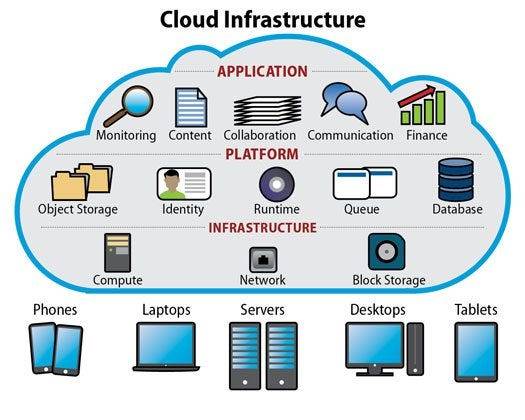
Cloud computing infrastructure consists of the hardware and software components — such as servers, storage, networking, and virtualization software — that are needed to support the computing requirements of a cloud computing model. It allows businesses to scale resources up or down as needed, ensuring cost efficiency and flexibility.
Understanding Cloud Computing Infrastructure
Cloud computing infrastructure refers to the combination of hardware and software components — such as servers, storage, networks, and virtualization software — that work together to support the delivery of cloud services. This infrastructure is foundational for deploying and managing applications and services in the cloud.
Essential Steps for Cloud Setup and Maintenance
#1. Planning Your Cloud Setup
Before diving into the technical aspects, it’s imperative to outline your business needs and goals. This includes:
- Assessing Requirements: Understand what applications and services need to be hosted on the cloud.
- Choosing the Right Cloud Model: Decide between public, private, or hybrid cloud models based on your security, compliance, and cost requirements.
- Budgeting: Allocate a budget for initial setup, ongoing maintenance, and potential scalability.
#2. Setting Up the Cloud Computing Infrastructure
Once planning is complete, follow these steps to establish your cloud computing infrastructure:
Select a Cloud Provider: Popular options include AWS, Microsoft Azure, and Google Cloud Platform. Evaluate them based on cost, features, and support.
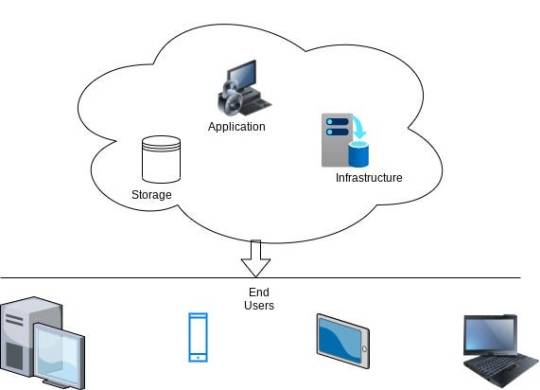
- Design the Infrastructure: This involves creating a blueprint of your cloud architecture, including networking, storage, and compute resources.
- Implement Security Measures: Ensure robust security protocols are in place to protect data and applications from threats. This includes firewalls, encryption, and identity management.
- Deploy Applications: Migrate your applications to the cloud environment. This might involve refactoring or re-architecting applications to optimize for cloud performance.
3. Cloud Maintenance Services
Maintaining your cloud environment is critical for ensuring performance, security, and cost-efficiency. Key aspects of cloud maintenance services include:
- Monitoring and Management: Regularly monitor cloud resources for performance issues and manage them to avoid disruptions.
- Security Updates and Patches: Keep your infrastructure secure by applying regular updates and patches.
- Backup and Disaster Recovery: Implement a robust backup strategy and ensure you have a disaster recovery plan in place.
- Cost Optimization: Continuously review and optimize your cloud spending to avoid unnecessary costs.
Implementing Salesforce Commerce Cloud Setup
For businesses looking to leverage Salesforce Commerce Cloud, the setup process involves:
- Initial Configuration: Set up the basic environment, including defining business settings, user roles, and permissions.
- Customizing the Platform: Tailor the platform to meet specific business needs through custom code, extensions, and integrations.
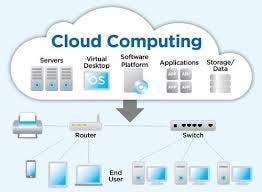
- Testing and Deployment: Thoroughly test the environment and applications before going live to ensure everything works seamlessly.
Conclusion
Building and maintaining a robust cloud computing infrastructure is pivotal for modern businesses aiming to achieve agility, scalability, and efficiency. Whether you’re setting up a new environment or optimizing an existing one, understanding the nuances of cloud setup and maintenance and leveraging professional cloud maintenance services can significantly enhance your operational capabilities. Embrace the power of Salesforce Commerce Cloud to drive your e-commerce initiatives forward, ensuring a seamless and secure cloud journey.
For a detailed guide on building a cloud computing infrastructure, visit [this comprehensive resource](https://experlabs.com/how-to-build-a-cloud-computing-infrastructure/).
0 notes